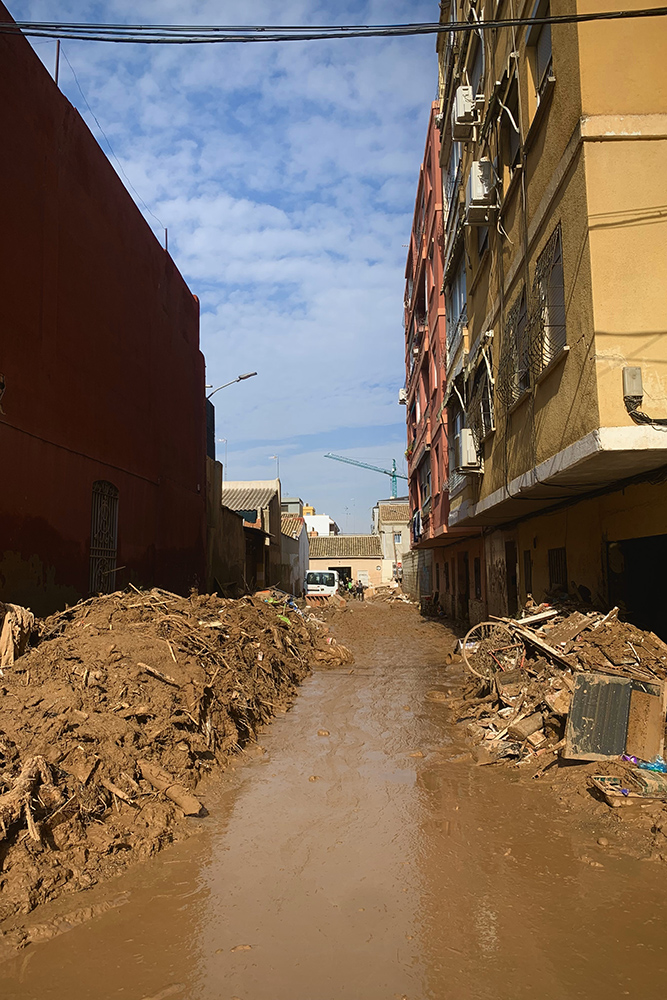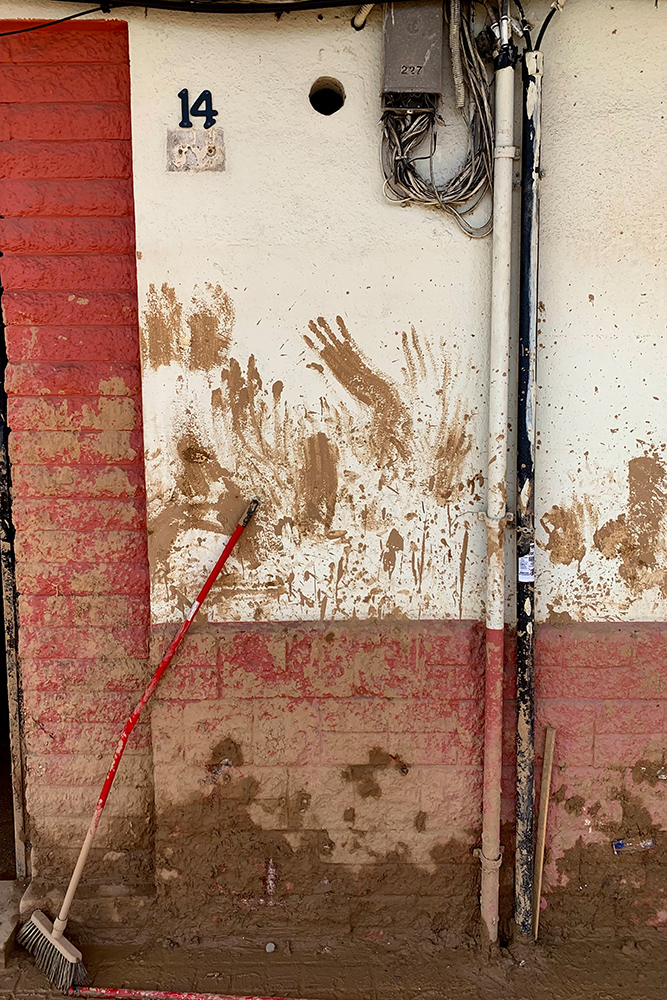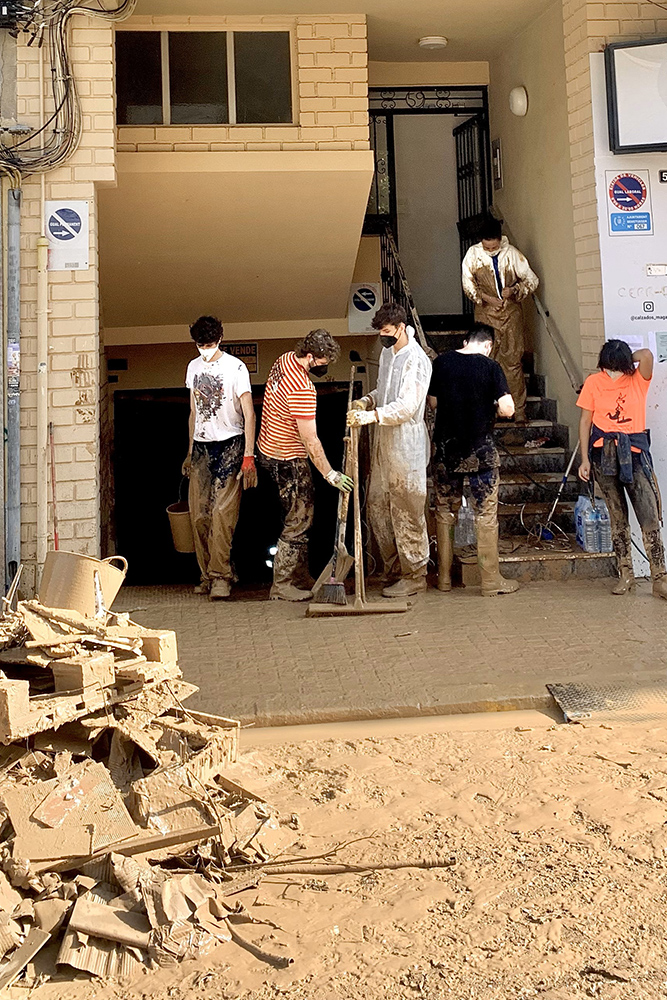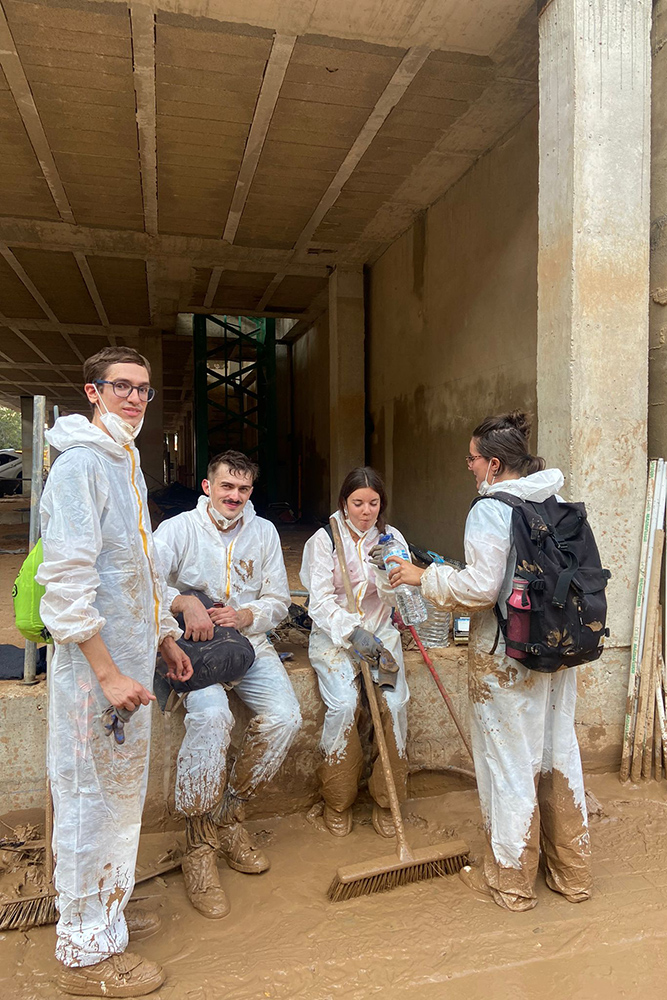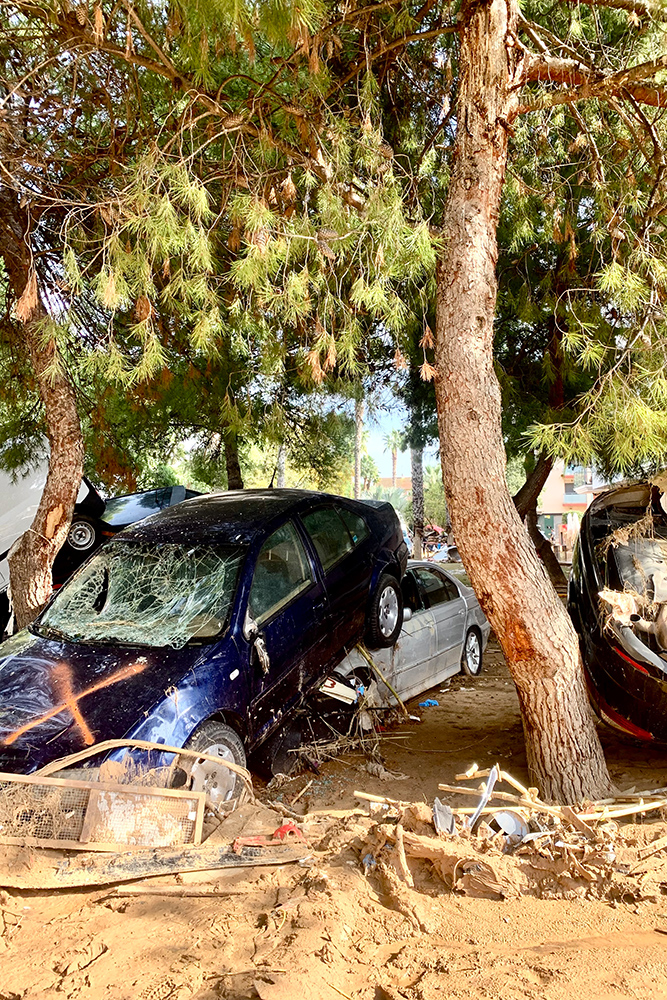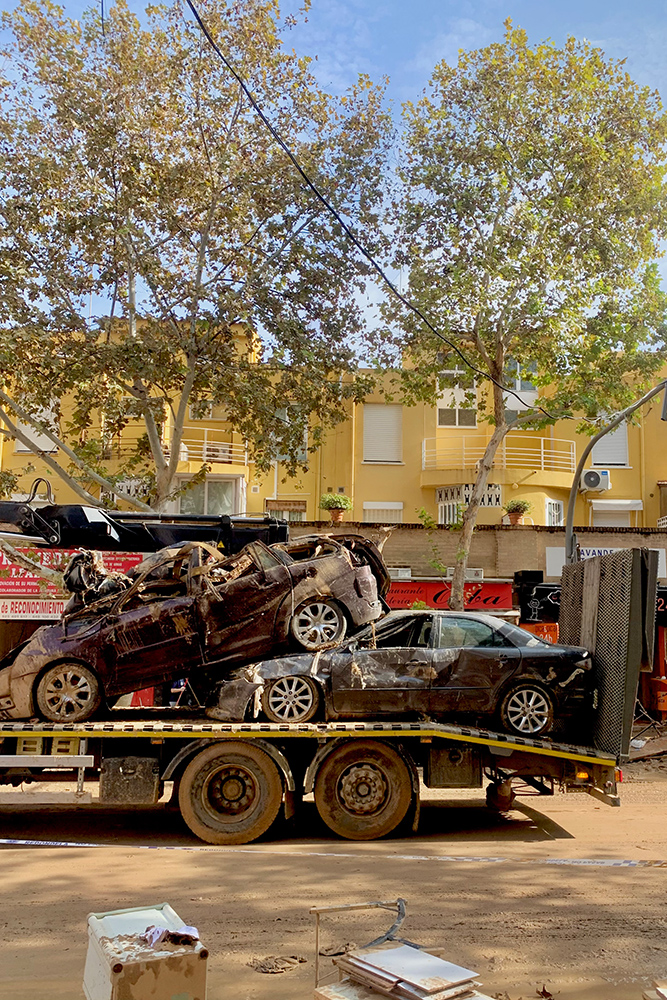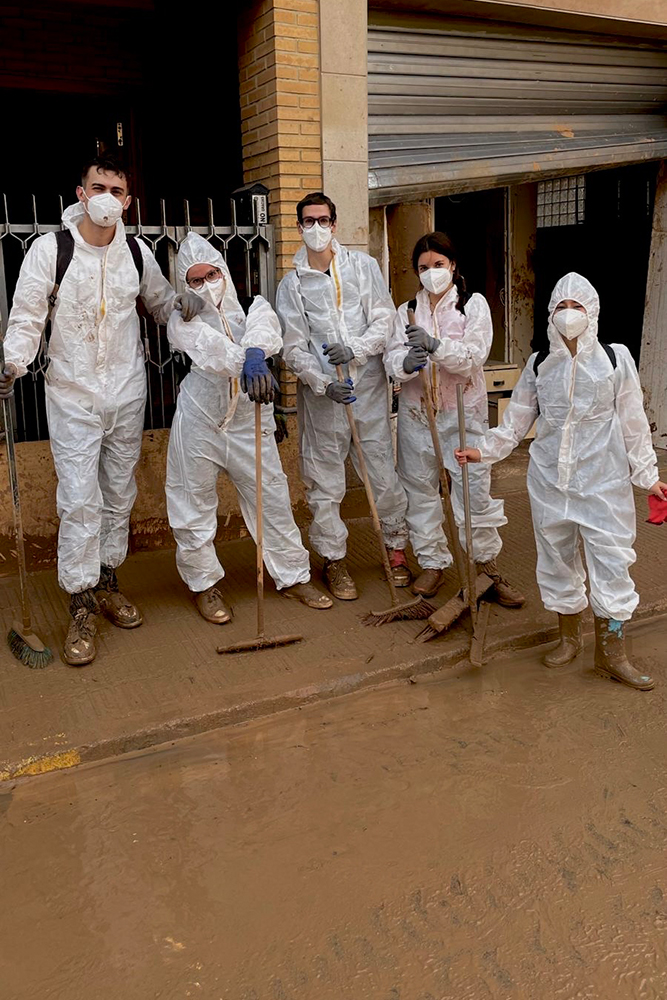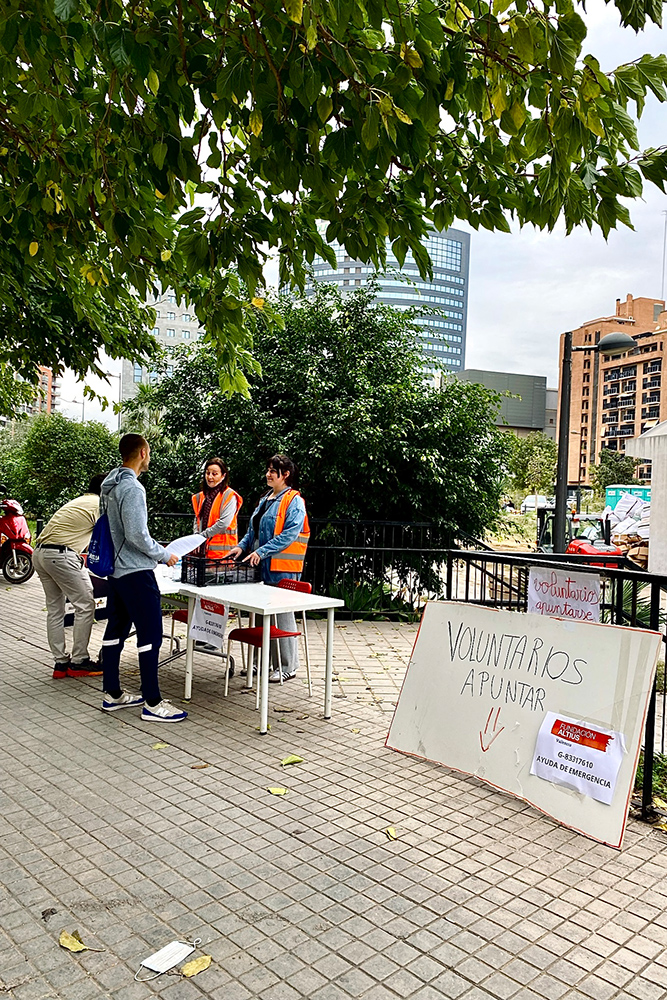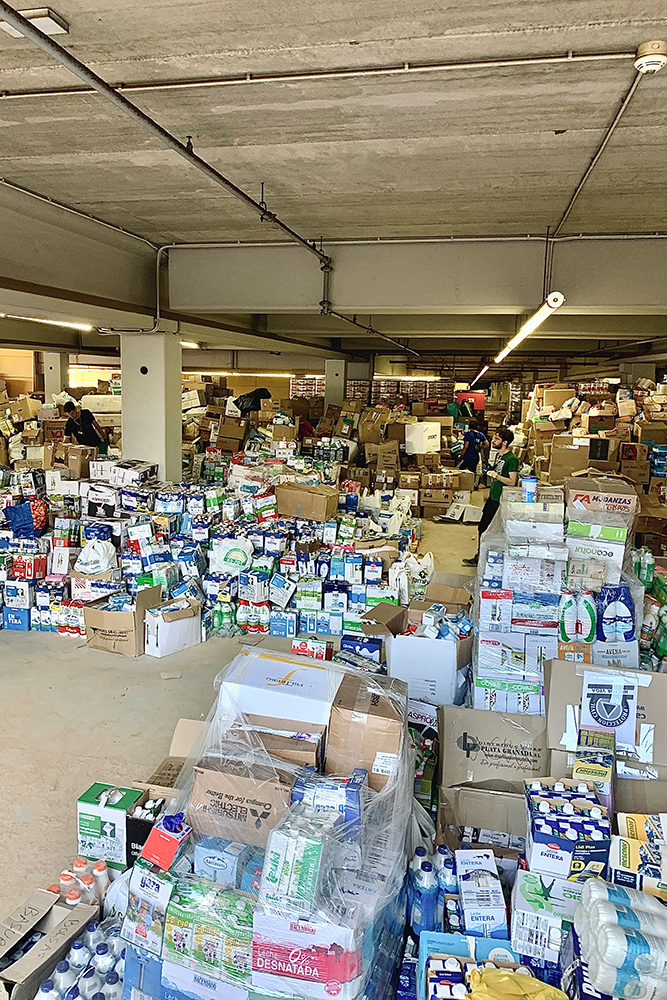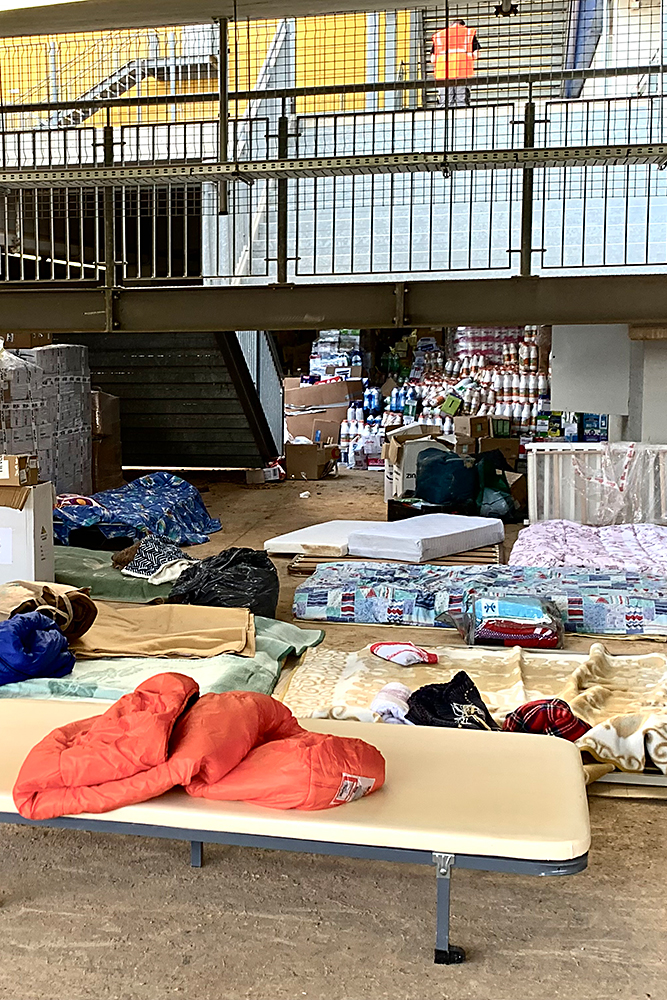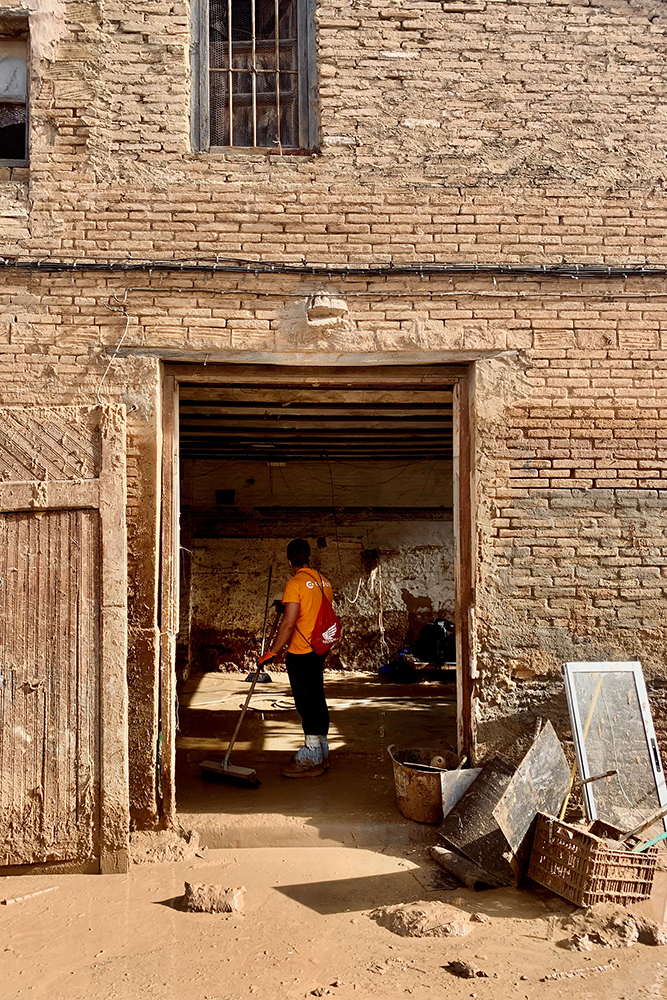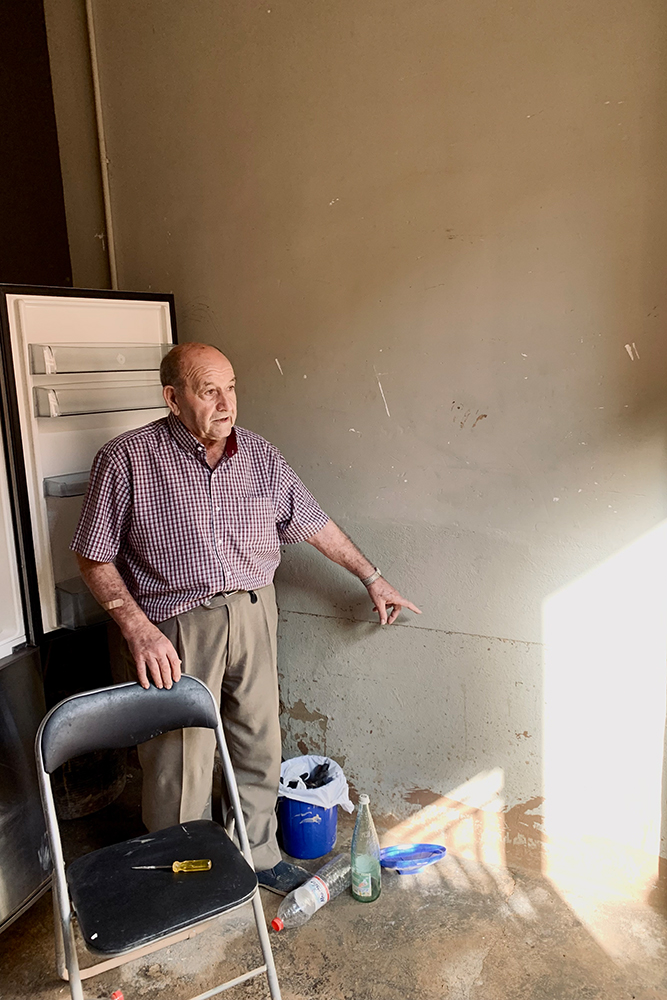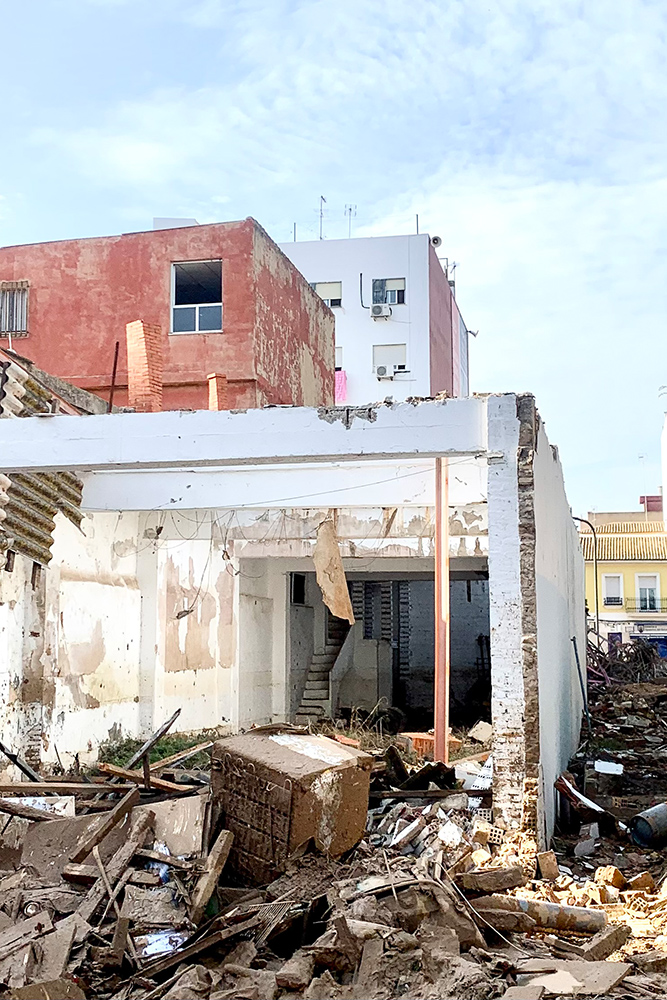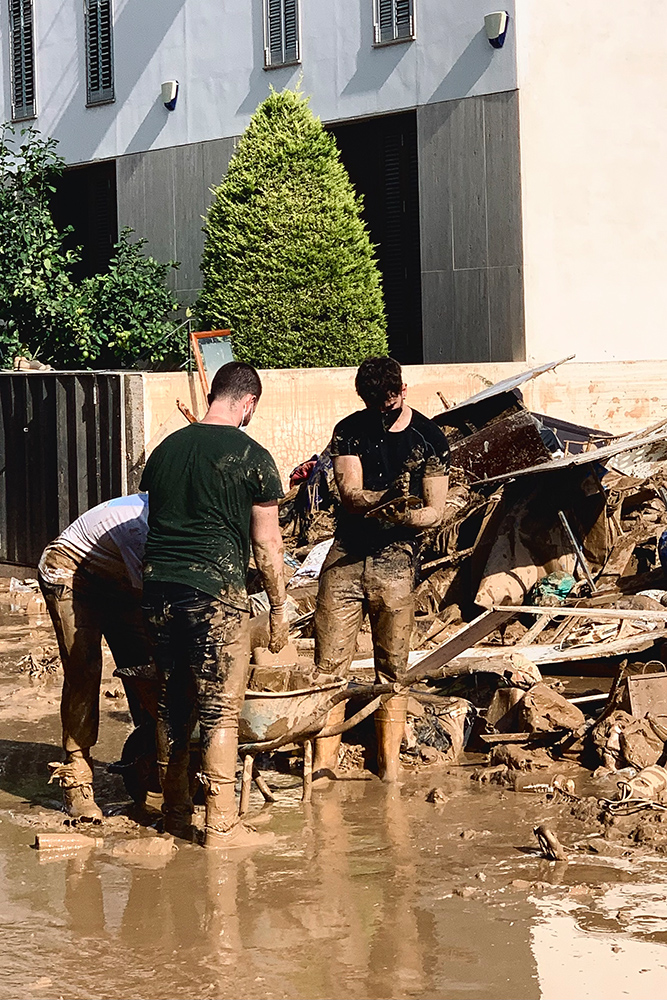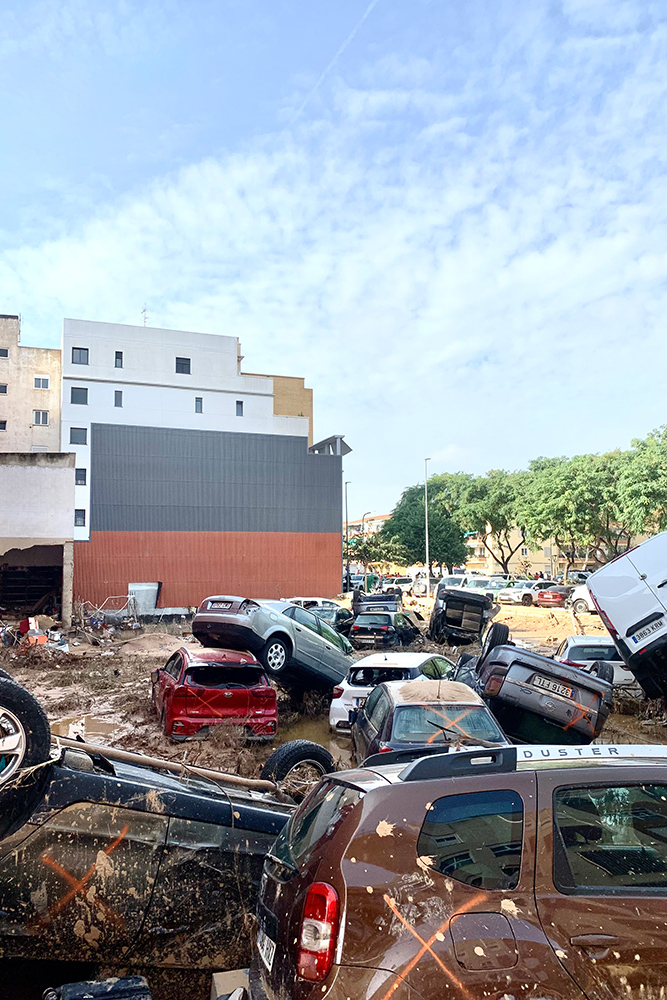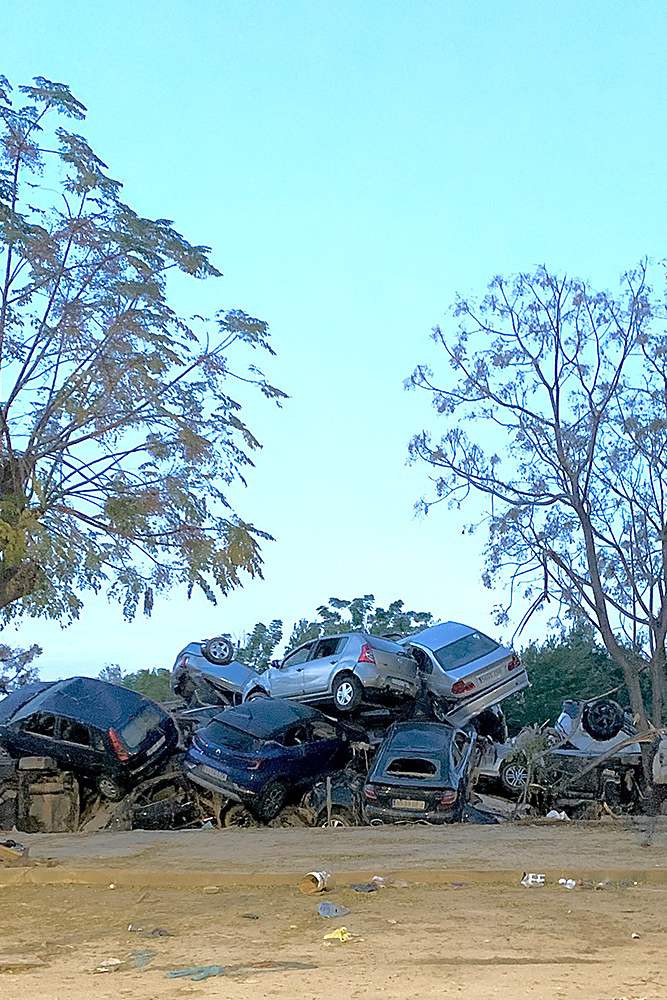Valencia: Caught off guard by the floods How architecture student Jonas Westphal became a flood helper
“There was mud everywhere.” Jonas Westphal is still shocked by what he experienced in southern Spain. The architecture student from Braunschweig is currently studying at Universidad Politècnica de València. He witnessed the flood disaster first hand and helped with the rescue efforts. Here he tells us about his very personal experiences.
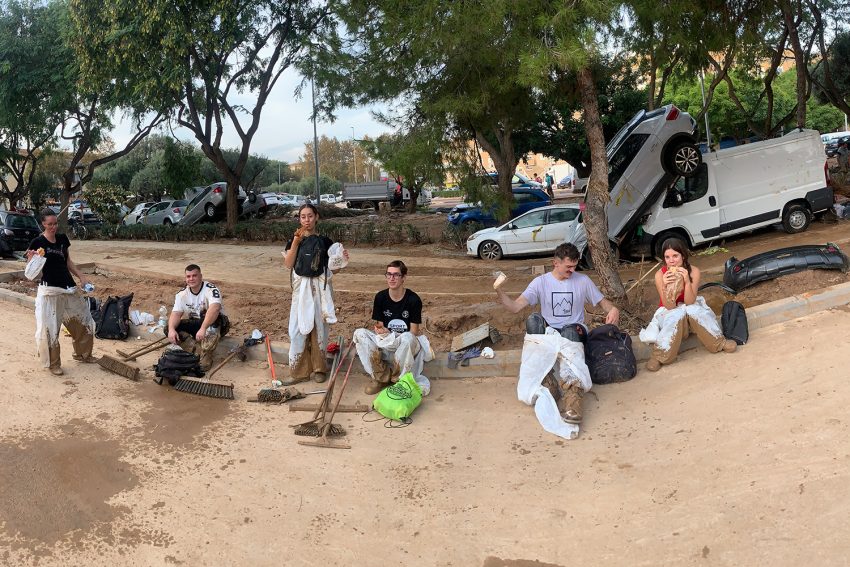
In Massanassa: after a long shift, it’s time for a break, surrounded by wrecked cars. Photo credits: Jonas Westphal/TU Braunschweig
I have been living in Spain for a good two months now, studying architecture as part of my semester abroad. One evening, I was still working on a project when a shrill noise pulled me out of my work. Loud sirens were blaring on my mobile phone and those of my flatmates: a text message announcing a Red Alert storm – which had already started. Outside, the storm was raging like nothing I had ever seen before. The wind was so strong that it was almost impossible to leave the house.
Our shared flat is located in the centre of Valencia, north of the Turia Canal. The River Turia, which used to flow through the city centre, has caused frequent flooding in the past, including the devastating flood of 1957. In response, the river was diverted to flow south of the city. This has effectively protected the central and northern areas of Valencia, like ours, from future flooding. However, the areas in the south are not protected. Not only are they outside the area protected by the new canal, but they are also close to the mountains, which leads to a higher inflow of rainwater and further increases the risk of flooding there.
I later found out that the delayed warning was due to the fact that just over a year ago, the UVE (Unitat Valenciana d’Emergències) disaster unit was deactivated by the state for cost reasons shortly after it was set up. As a result, early warning systems that were vital for survival were no longer available.
A detour to the airport
The storm brought both road and air traffic to a standstill. I was able to delay my flight for a funeral that day by one day. But getting to the airport turned out to be much more difficult than expected: public transport was virtually at a standstill. All the roads were jammed and not a single car was moving. A friend took me to the airport on his motorbike, using the pavements. I reached my destination and luckily arrived safely in Bremen with my family.
Four days later, I was on my way back. The storm had not fully passed and videos on the news and social media leftme feeling worried. The full aircraft was approaching the storm at night and the turbulence was very noticeable. I looked up through the raindrops at the blurred lights of the city of Valencia. The clouds above us formed a black wall as lightning flashed through them. Moments later, a young woman’s voice announced: “In case of emergency, please don’t take any personal belongings with you.” The nice announcement seemed to contradict the frightening content. I was gripped by a tremendous fear that I rarely felt. In the end, we landed safely. By then, the taxis were running again. On the way home, the streets of Valencia were littered with shredded rubbish bins, overturned traffic signs and uprooted trees. The streets of the usually busy town were empty.
Plastic bags instead of rain boots
The next day, I had arranged to meet friends and head to the south of Valencia to help those directly affected. My friends had been there for a few days and were familiar with the circumstances. A few buses that were already running took us south in 45 minutes. On the one hand, I was looking forward to helping, but on the other, I dreaded getting close to all the suffering. At the same time, my anger grew towards those who deny man-made climate change and prevent environmentally sound policies and early warning systems that are essential for survival.
After almost an hour’s bus ride, we arrived, and almost all the passengers got off, equipped with brooms, squeegees and rain boots. We didn’t have the latter, so we put our trousers and socks into plastic bags and put them into our shoes. We attached the bags to our legs with masking tape. The masks protect us from pathogens: hepatitis A, tetanus and bacterial skin diseases were mentioned. Standing, warm water is the ideal environment for bacteria, viruses and parasites. On top of that, there are vectors such as rats, cockroaches and mosquitoes. Armed with this knowledge, we set off on foot because the buses didn’t go any further. The closer we got to the disaster, the more my breath was taken away.
“There was mud everywhere”
At first I saw huge piles of objects that had been thrown to the side of the road. Among them were broken chairs, torn mattresses, dented fridges, destroyed road signs, even cars that were barely recognisable by their shape, and much more that was unidentifiable due to the mud and damage. There was mud everywhere. It was so thick that it would not drain away on its own. People were trying to push it out of the houses and down onto the streets. The force of nature was enormous. Everything the flood could reach was destroyed: dented and even burst garage doors, cafes and shops without a single piece of furniture left intact, brown paint on almost all the houses up to at least a metre above the ground… The closer I got to the city, the more intense it became. The mud was so deep that I couldn’t even see my own shoes. In some places it was three metres high just a few days ago.
According to the media, 300 and sometimes up to 500 millimetres of rain fell within eight hours, equivalent to up to 500 litres of water per square metre. On average, this equates to about 50 litres per square metre in an hour. An average rainfall in Germany is only about six litres of water per hour, almost a tenth of what fell in Valencia.
Personal memories gone forever
While cleaning out a house, I spoke to the owner, a 79-year-old man. His name is Juanjo. He told me that he had always lived in this house. Now all his personal belongings on the ground floor are gone forever. His furniture, personal mementos of his ancestors, even his cars and motorbike in the garage are damaged. Juanjo says they no longer work. That’s probably how it is with a lot of things. Either they were washed away by the flood or you can throw them away. And then there is all the dirt. Although it took about three hours and about 20 volunteers to get the worst of it out, the walls and floor are still covered in dirt.
I am glad that so many people are helping. It would have been impossible for Juanjo and his wife to carry the shelves back and forth, push the heavy wooden tables back into place, and carry out the huge amounts of mud. Even though most of it has been cleared away for now, the smell will linger for a while. Whilst helping, I was struck by the strong sense of community among the Spanish. Nobody spends a lot of time wondering how things are going to work, nobody argues or complains. Everyone is there to lend a hand.
When I got home tired in the evening, I saw on the news that the King had travelled to the affected areas to see the situation for himself and to express his condolences. Many people were very angry about the late warnings and the disaster management, and they threw mud and insults at the visitor. It was later suspected that the protests were also used by right-wing extremists to increase people’s dissatisfaction with the government.
Collecting and distributing donations
Over the next few days, new tasks arose, so we went to a large furniture store. There we set up a central point from which we distributed the aid. The goods had been collected at the Valencia stadium and distributed to the trucks, which left the stadium with a lot of honking, clapping and cheering and finally drove to the south of Valencia. The furniture store was spontaneously turned into a relief depot. All kinds of donations arrived: pasta, UHT milk, biscuits, beans, canned fish, jam, toast, baby food and many other food items on one side, and rain boots, brooms, clothes, shoes, nappies, cleaning products, paper plates, wooden cutlery and other everyday items on the other.
My job, along with other volunteers, was to collect these goods and distribute them to the right places. In the food section, we prepared “Mixtos”, emergency food packages, which were then passed on to households. We put a little bit of each food category in a box. I often imagined the people receiving the packages and how happy they would be. At the same time, it made me aware of how serious the situation was. Still, it was nice to see how much was donated and how much people helped without a second thought. We were constantly busy with new supplies arriving on a regular basis.
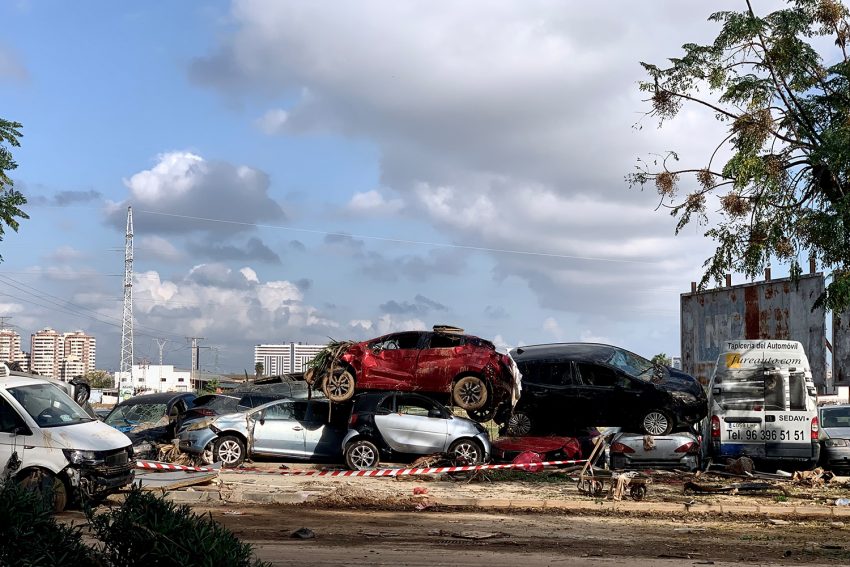
After the flood: The destroyed cars were collected and stacked here, none of them are usable anymore. Photo credit: Jonas Westphal/TU Braunschweig
Overflowing rubbish heaps
On our way home, we walked through the dirty streets again, which at least looked much better than on the first day. We passed ambulances, military vehicles and overflowing rubbish dumps. Maybe that’s where Juanjo’s favourite armchair was. Wrecked cars were piled up on the side of the road. Many of them had an orange X sprayed or stuck on them. I wondered what this was all about. Later, a friend explained to me that the X marked the cars where bodies had been found.
The number of dead had now grown to over 220. With this knowledge in the back of my mind, and with so many destroyed homes, soldiers surrounding us, broken fences, smashed windows, blocked roads and so much suffering, I sometimes felt like I was in a war zone. It was one big disaster.
As we made our way back home, I looked down at my phone. An email said that our lectures and tutorials would now be held digitally for a month. This was not how I had imagined my stay abroad. I leaned exhaustedly against the window of the bus that took me home, wondering how long it would take for the place to recover from this state, if it ever would. Even if one day the cars are replaced, the trees regrown, the walls painted and the mud removed from every last corner, the people who died in the natural disaster will never know it. And it will not be the last disaster.
Jonas Westphal

